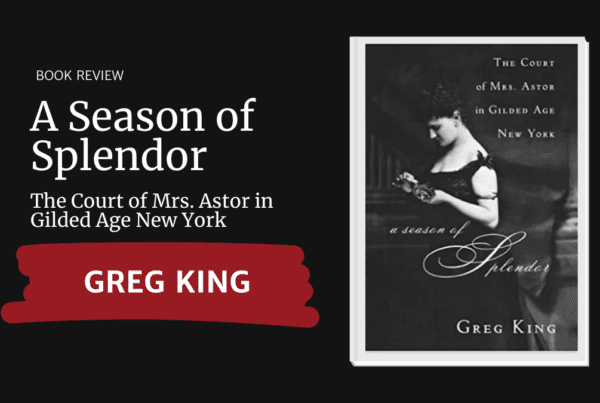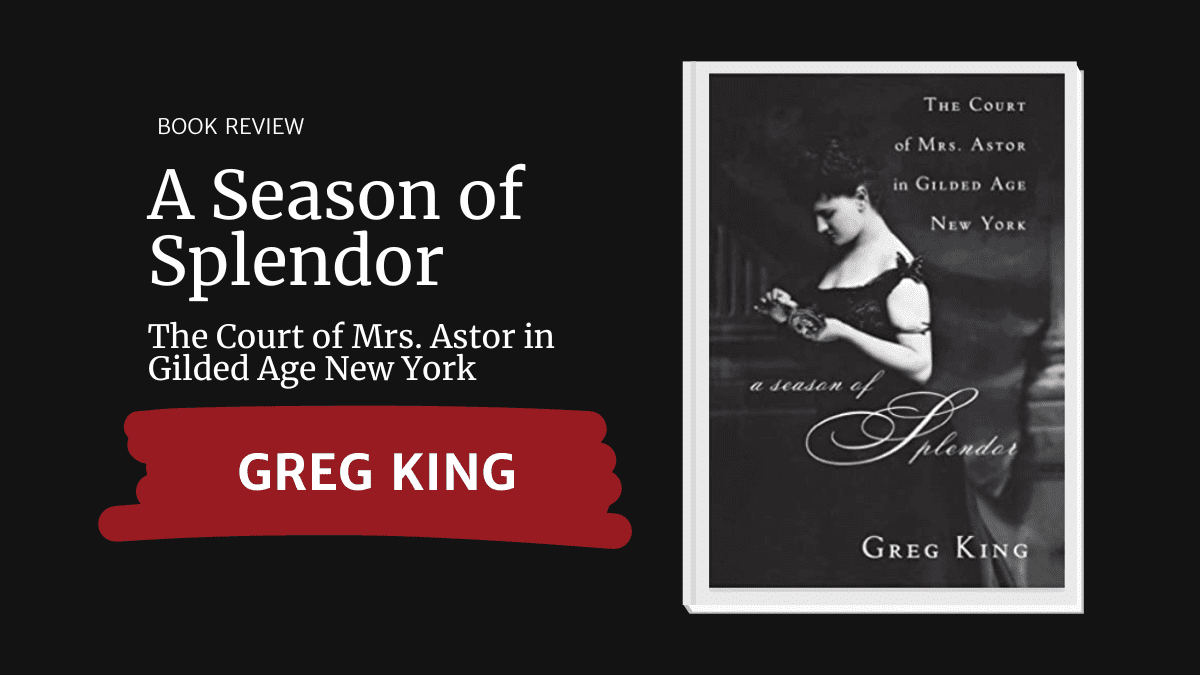Greg King’s a Season in Splendor is a masterful guide to America’s coming of age.
To begin my research on The Gilded Age, I turned to Greg King’s authoritative A Season of Splendor: The Court of Mrs. Astor in Gilded Age New York. I’ve read a lot of King’s books on the Romanovs (they are all on my Romanov Reading List) and therefore knew I’d be in expert hands. I was not disappointed!
Though King spends ample time on the fascinating career of Caroline Astor, whose ballroom capacity dictated the limits of New York’s society or “The Four Hundred,” A Season of Splendor is a much deeper dive into the Gilded Age from 1870s to 1914. In his signature gossipy tone, with plenty of juicy quotes, King charts the spectacular rise of the nouveau riche element in society: railway barons, oil and steel magnates, bankers, and merchants, and their relentless quest to join Mrs. Astor’s circle.
King moves through all aspects of Gilded Age life, hammering home the overarching theme of the period: that America had “arrived” both financially and culturally, and was the equal of the Old World. And yet, Gilded Age society did everything it could to copy Old World traditions, from liveried footmen to Renaissance palazzos in Newport, the Berkshires, and the Hudson River Valley, and a highly regimented social season featuring European style dinner parties and society balls.
A Season in Splendor explores the phenomenon of the “dollar princesses,” the wealthy daughters of Gilded Age millionaires who married into European aristocracy — a topic covered so well in Edith Wharton’s novel The Buccaneers. The cautionary tales of Consuelo Vanderbilt, daughter of Mrs. Astor’s nemesis, Alva Vanderbilt, and Jennie Jerome, mother of Winston Churchill, will, I expect, will inform the plots of future seasons of Julian Fellow’s new series, The Gilded Age. Both Consuelo and Jennie married into the family of the Dukes of Marlborough: Consuelo to the ninth Duke of Marlborough, and Jennie to the duke’s uncle, Lord Randolph Churchill.
King brings us to the end of the Gilded Age on board the Titanic with Mrs. Astor’s son, Jack and his second wife, Madeline. King argues that without Caroline Astor, Gilded Age society was once again adrift, just as post-Civil War America’s had been at the dawn of the age.
“For just forty years,” writes King at the end of A Season in Splendor, “from the establishment of the Patriarch balls until the sinking of the Titanic, Caroline Astor’s artificial, opulent, and ultimately fragile society had dazzled and intrigued, enticed and infuriated. The successful melding of respected lineage with recent money to create an American aristocracy had demanded stringent adherence to rules of behavior both traditional and new. While Caroline remained at the helm, this society could be controlled, its members shepherded through its intricacies, and its aspirants made to properly expiate the sins of their background and the crispness of their money.”
A Season in Splendor is an engaging and nuanced exploration of America’s coming of age.
More Books About the Gilded Age
- The Gilded Age, Mark Twain
- When the Astors Owned New York
- Edith Wharton, Hermione Lee
- Sanford White in Detail, Samuel White
Other Books By Greg King
- The Court of the Last Tsar: Power and Pageantry in the Reign of Nicholas II
- Twighlight of Splendor: The Court of Queen Victoria During her Diamond Jubilee
- The Assassination of the Archduke: Sarajevo 1914 and the Romance that Changed the World
- The Last Voyage of the Andrea Doria
See my full Romanov Reading List
Join my Newsletter Community
Get reviews and recommendations twice a month!
Enjoy More Book Reviews Like This One
 The British Cookbook
The British Cookbook
The British Cookbook
 Paradise Postponed
Paradise Postponed
Paradise Postponed
 A Season of Splendor: The Court of Mrs. Astor in Gilded Age New York
A Season of Splendor: The Court of Mrs. Astor in Gilded Age New York
A Season of Splendor: The Court of Mrs. Astor in Gilded Age New York
 All Creatures Great and Small Audiobook
All Creatures Great and Small Audiobook
All Creatures Great and Small Audiobook
 Pierogi: Over 50 Recipes to Create Perfect Polish Dumplings
Pierogi: Over 50 Recipes to Create Perfect Polish Dumplings
Pierogi: Over 50 Recipes to Create Perfect Polish Dumplings
 Agatha Christie: An Elusive Woman By Lucy Worsley
Agatha Christie: An Elusive Woman By Lucy Worsley
Agatha Christie: An Elusive Woman By Lucy Worsley
 The Widow Queen: A Novel by Elżbieta Cherezińska
The Widow Queen: A Novel by Elżbieta Cherezińska
The Widow Queen: A Novel by Elżbieta Cherezińska
 Secrets of the Sprakkar
Secrets of the Sprakkar
Secrets of the Sprakkar
 The Memory of the Second World War
The Memory of the Second World War

